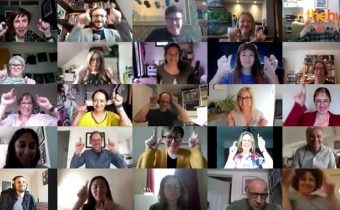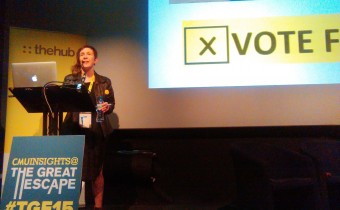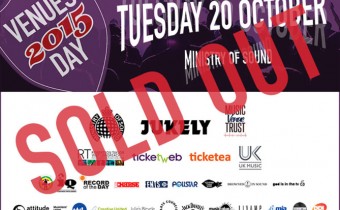Some early morning musings on Labour Party new creative industries network plans
Last night, the shadow culture secretary, Ivan Lewis MP, announced the launch of the Labour Party’s new Creative Industries Network, established it seems to link arts organisations with businesses. Members will include arts organisations, trade unions and businesses, and the network will be tasked with determining what arts organisations need in order to develop important business skills and generate the priviate income needed for them to “become global enterprises”, as well as reviewing the tax treatment of the creative industries. The latter will be led by Patrick McKenna, former chief executive of the Really Useful Group and founder of Ingenious, while the network will be chaired by Andrew McGuinness, chair of the Advertising Association.
Lewis spoke of the need to “match our cutting edge creative ideas with an equally creative global business strategy which ensures we can benefit from the new jobs and growth of the future”, adding that “The Conservative-led government has so far failed to provide the strategic leadership which is urgently required, and in education and the arts, they are implementing policies which are damaging the foundations of our creative success.” Other demands made by Lewis included a call or more cross-department working within government and for the collation of rigourous data about the sector.
The creation of the network is to be welcomed we think; it’s too easy for us all to work in our own silos, and an opportunity for a real opportunity for sector leaders to come together – to share ideas, develop joint initiatives and present a coherent set of policy recommendations – can only be a good thing.
In response to Labour’s plans, a couple of ‘morning after the night before’ points that our experience here at the hub immediately called to mind are:
1. Firstly, in terms of learning the business skills required to generate private investment, not all businesses want to become global enterprises, but that doesn’t mean they don’t need help to develop their business skills.
We’d say that Labour’s review needs to listen hard to the multitude of small businesses which together form the backbone of the creative sector about their ambitions and development needs.
We’ve done a lot of work with small businesses like this, for the Arts Council, various former Regional Development Agencies and the Learning and Skills Council, and know a fair bit about their business development needs, and what works and what doesn’t. We’d hope to follow up on this with the network, and would be happy to share what we know and plans we’ve developed for a Joining the Dots programme that in part will do just this.
2. Looking at the fairness pledge, which aims to ensure those signed up to it offer internships and jobs on the basis of merit rather than social background, we of course support that proposition. Who wouldn’t? However, many small businesses still find the costs of offering creative apprenticeships prohibitively expensive and CC Skills appears unable to get its head around the idea of small businesses offering a ‘collective’ apprenticeship, potentially across SMEs sharing creative industries ‘hub’ spaces. This is something of a hobby horse issue for us – and has been in our discussions with CC Skills down the years.
For the time being, internships are often the only way for small businesses to provide the entry level experience that is so important to those entering the creative sector these days. And many -ourselves included – pride themselves on offering an incredibly valuable, carefully sructured opportunity. Public sector support to help the ‘common man’ small businesses in the sector to provide more financially rewarding entry level internships would surely be a good thing?
3. Next, arts organisations are businesses, regardless of whether they have charitable status or not. Their business aims may be charitable, or they may be ‘for profit’, but either way, they are still businesses. It’s semantics you might argue, but we’d say the semantics get in the way of a bigger, cultural issue for the cultural sector. We work a lot in the music sector, and here the economy is very mixed, with individual artists working as micro businesses, and a multitude of small businesses working tirelessly to survive. These guys have to operate as businesses – albeit with charitable or social entreprise models – if they are to survive. So, using common terminology, are these guys, are we, an arts organisation or a business? We tend to describe ourselves an ethical business working in the creative sector. 4. And finally, back to that point about rigourous data. Yes, absolutely that’s needed. And without giving too much away, we’d suggest that everyone keeps an eye on info coming out of the National Campaign for the Arts l ater this autumn. We’re working with the NCA at the moment, and can’t say too much, but there are some really interesting numbers being crunched at the moment. If you want to keep up to date with that then sign up to our hub email newsletter.
And so to today’s work…



